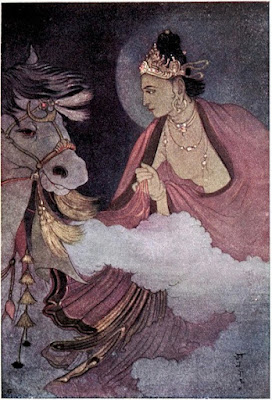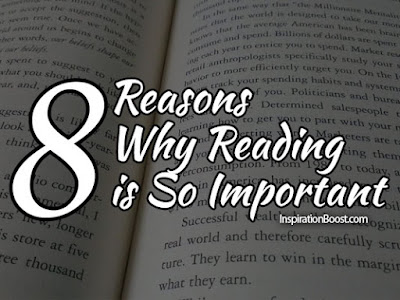Reading Notes: Life of Buddha, Part B
I liked Buddha's reflective and meditative nature: "I would be off to find eternal beatitude. The deep joy I feel, the indomitable strength that now sustains my will, the assurance that I have a protector even though I am alone, all these things tell me that I am about to attain my goal. The hour has come; I am on the road to deliverance."
He decided to abandon his life's pleasures to become a deeper spiritual being. For someone born with wealth and privileges, I thought it was a very difficult decision to do.
It was also very interesting how Siddhartha was talking to a horse with so much genuine emotion:
"Companions in arms or in pleasure are not hard to find, and we never want for friends when we set out to acquire wealth, but companions and friends desert us when it is the path of holiness we would take. Know then, O Kanthaka, that it is a virtuous impulse that moves me. Lend me your strength and your speed; the world's salvation and your own is at stake."
There are countless myths and epic stories in the world, but I think it's rare to find a story that protagonist puts so much rapport and emotion into his riding horse. Siddhartha obviously was an emotionally intelligent person.
I thought Siddhartha was adventurous and determined person with an unusual willpower: "He felt no regret, and in a steady voice, he cried: 'Until I shall have seen the end of life and of death, I shall not return to the city of Kapila.'"
I liked the purpose of Siddhartha's hermitage: "Mine is a worthier reason: I will destroy old age and death." I have always been afraid of getting old and dying (although I'm a young person who is in 20's). Apparently, Siddhartha failed his mission despite his enormous devotion to hermitage and meditation: people still do get old and eventually die.
I thought this belief could be debated, but I think it's usually true: "Unhappiness is born of desire; that man is to be pitied who is a slave to his passions."
I think it depends on what kind of desire it is. If someone is obsessed with money and material things to the point he hurts his mental health, desire can be a source of unhappiness. But desires like falling in love with someone, I think, can be a good desire.
Siddhartha gave up his worldly pleasures and slept in coarse grass in the forest.
This vivid and rich description of the road to the tree of knowledge was fascinating:
"The road was sprinkled with gold-dust; rare palms, covered with precious stones, lined the way. He skirted the edge of a pool whose blessed waters exhaled an intoxicating perfume. White, yellow, blue and red lotuses spread their massive petals over the surface, and the air rang with the clear songs of the swans."
I thought this description of reincarnation resonated really well with that of Hinduism:
"He now clearly saw all creatures being continually reborn, and, whether of high or of low caste, in the path of virtue or of evil, he saw them going through the round of existences, at the mercy of their actions."
The two religions, Buddhism and Hinduism, were both born in the Indian subcontinent, so they have similar perception of life cycle.
This rather pessimistic belief about life and reincarnation made me think deeply: "What is the cause of old age and death? There is old age and death because there is birth. Old age and death are due to birth. Oh, the torment of perpetual rebirth!"
Each birth and life is going to be different, so I think it can be either happy or sad depending on how he or she does during their life. In other words, happiness is up to the person who is responsible for his or her life. So Buddha's pessimistic belief that life is inherently pain and suffering can be debated.
He decided to abandon his life's pleasures to become a deeper spiritual being. For someone born with wealth and privileges, I thought it was a very difficult decision to do.
It was also very interesting how Siddhartha was talking to a horse with so much genuine emotion:
"Companions in arms or in pleasure are not hard to find, and we never want for friends when we set out to acquire wealth, but companions and friends desert us when it is the path of holiness we would take. Know then, O Kanthaka, that it is a virtuous impulse that moves me. Lend me your strength and your speed; the world's salvation and your own is at stake."
There are countless myths and epic stories in the world, but I think it's rare to find a story that protagonist puts so much rapport and emotion into his riding horse. Siddhartha obviously was an emotionally intelligent person.
I thought Siddhartha was adventurous and determined person with an unusual willpower: "He felt no regret, and in a steady voice, he cried: 'Until I shall have seen the end of life and of death, I shall not return to the city of Kapila.'"
I liked the purpose of Siddhartha's hermitage: "Mine is a worthier reason: I will destroy old age and death." I have always been afraid of getting old and dying (although I'm a young person who is in 20's). Apparently, Siddhartha failed his mission despite his enormous devotion to hermitage and meditation: people still do get old and eventually die.
I thought this belief could be debated, but I think it's usually true: "Unhappiness is born of desire; that man is to be pitied who is a slave to his passions."
I think it depends on what kind of desire it is. If someone is obsessed with money and material things to the point he hurts his mental health, desire can be a source of unhappiness. But desires like falling in love with someone, I think, can be a good desire.
Siddhartha gave up his worldly pleasures and slept in coarse grass in the forest.
This vivid and rich description of the road to the tree of knowledge was fascinating:
"The road was sprinkled with gold-dust; rare palms, covered with precious stones, lined the way. He skirted the edge of a pool whose blessed waters exhaled an intoxicating perfume. White, yellow, blue and red lotuses spread their massive petals over the surface, and the air rang with the clear songs of the swans."
I thought this description of reincarnation resonated really well with that of Hinduism:
"He now clearly saw all creatures being continually reborn, and, whether of high or of low caste, in the path of virtue or of evil, he saw them going through the round of existences, at the mercy of their actions."
The two religions, Buddhism and Hinduism, were both born in the Indian subcontinent, so they have similar perception of life cycle.
This rather pessimistic belief about life and reincarnation made me think deeply: "What is the cause of old age and death? There is old age and death because there is birth. Old age and death are due to birth. Oh, the torment of perpetual rebirth!"
Each birth and life is going to be different, so I think it can be either happy or sad depending on how he or she does during their life. In other words, happiness is up to the person who is responsible for his or her life. So Buddha's pessimistic belief that life is inherently pain and suffering can be debated.
Siddhartha departs his kingdom. Source: Siddhartha's departure
Bibliography:
The Life of Buddha by Andre Ferdinand Herold (1922)




Comments
Post a Comment